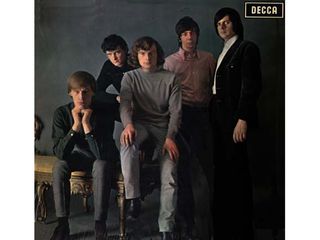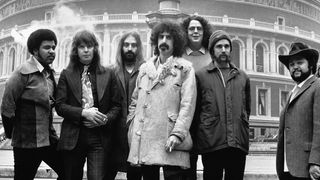Iggy Pop remembers the first album he ever bought. It was 1960, and soon-to-be punk pioneer was 13 years old. "I had $1 of my own money," he says, "and I bought 'Red River Rock,' an album by Johnny and The Hurricanes, at the Woolworth's in the first mall opened in southern Michigan."
In Jeff Gold's upcoming book, 101 Essential Rock Records: The Golden Age Of Vinyl, From The Beatles To The Sex Pistols, Pop, a 2010 Rock And Roll Hall Of Fame inductee with The Stooges, writes about two albums that had a huge impact on his musical sensibilities: The Angry Young Them (featuring a new singer by the name of Van Morrison) and The Mothers Of Invention's Freak Out.
101 Essential Rock Records sees Pop joined by fellow musician essayists, such as Graham Nash, Devendra Banhart, David Bowie, Peter Buck, Nels Cline (Wilco), Robyn Hitchcock, Johnny Marr and Suzanne Vega, all of who share their thoughts on some of their favorite discs.
On 30 November in the US, 101 Essential Rock Records: The Golden Age Of Vinyl, From The Beatles To The Sex Pistols will be available in hardcover. (You can pre-order it here.) The book will be published in the UK and Europe on 6 December and in Australia on 16 December.
The following is Iggy Pop's essay on The Angry Young Them and Freak Out, reprinted by permission of Gingko Press.
I found out about music and groups from my friend in junior high school, Jim McLaughlin. He had a guitar and amp, because his dad was a ham radio nut. He played me his Ray Charles records, and Elvis too. We formed a duo for the school talent show; I called it the Megaton 2. We played "What I'd Say" and "Let There Be Drums," which was a record I owned by Sandy Nelson. Later Jim and I started The Iguanas.
The radio in Detroit wasn't that great, but nowhere near as bad as it is now. You could hear the Beatles, Stones, Ronettes, Wailers, Booker T, early Motown, Jackie Wilson, the Kinks, and other good stuff on CKLW, the Detroit AM station, but you had to be patient and listen to lots of shit like Peter and Gordon, Freddie and the Dreamers, Leslie Gore, Frankie Avalon, etc. to hear what you liked.
When I later got a job at a record store, it really opened up my knowledge of music. The other people who worked there were experts in classical music, avant-garde, R&B and blues as well as rock, and I took it all in. The store was loosely organized, so when I wanted to hear a record, I just opened it up and played it right there.

I probably first heard "Gloria" by Them. When I bought the album, it was the American version of "The Angry Young Them," the same album, but with a hideous ugly orange cover, and it just said "Them." Now I have a vinyl copy of the original. It still blows my mind. I would listen over and over and over to "Mystic Eyes" and "One Two Brown Eyes." Those two cuts really influenced my ideas of what The Stooges could be.
At about that time I was listening to all the good English groups, plus Bob Dylan, plus anything that came from San Francisco, plus Love, plus tons of garage rock. Them was by far the most experimental, but also had a kind of doomed quality that I liked, because I could see that these guys weren't cute, didn't know how to dress and did not have a commercial touch except for the one hit, "Gloria." "Gloria" at the time was completely inescapable all over the U of M (University of Michigan) campus and at any club, anywhere with live music. Every band covered it, including my own.
I think the liner notes were really pathetic. What a great example of a repressed, apologetic, neurotic show-biz bullshitter. I never saw Them, but I saw Van play once at the Troubadour in LA. It was around the time of "Moondance." He was very stern, and the group members all looked ill.
He was so cool, the best thing he did was pick up a chair with one hand and wave it over his head while he screamed. I saw him do the same thing on TV on "American Bandstand." I guess it was his one stage move. I've always wondered where he got it. The way Van's voice ripped through the mic, and the simple arrangements and spirit of experiment, was a huge deal for me. I still listen to the record in the early mornings and when I want to get worked up.
The first time I heard "Freak Out" by the Mothers of Invention was on headphones, smoking an early joint in my drug career, at the house of SRC, a Michigan band of the 60's. That night I kind of knew they were asking (Stooges guitarist) Ron (Asheton) to leave our group and join up with them, so I was hanging around to see what was going to happen. Rather than waste my time, I saw a copy of "Freak Out" and listened to it on the phones.

I thought it was very, very funny. I particularly loved "Help, I'm a Rock," "America Drinks and Goes Home," "Who Are The Brain Police" and the cameo of Suzie Creamcheese. I had already seen the Fugs live on stage, with Tuli Kupferberg changing costumes out of a large bag in a humorous way, so I was somewhat prepared. I liked the Mothers' conceptualism and humor, although the music didn't really do much for me. My own experiments were more influenced by Bob Ashley, Harry Partch, and Berlioz.
The first time I saw The Mothers I was opening for them; it was the second or third gig the Stooges had ever done, so I remembered us more than them. I think playing with them so early in our career pushed me to be weirder faster, and also to be stranger to look at, earlier than I would have been otherwise. That night I did my first stage dive. I knew the Mothers were on after us, and I didn't want people to forget about us.
Years later I got to know Frank a little bit, and he was very decent to me. We went out for a burger once in Berlin, to a bright lit cheap and greasy joint, with David Bowie. That was pretty funny and unusual. Frank was kind of a wry person, and as he made clear in his film "200 Motels," he had a certain ambivalence about English rock stars. I went along with Frank later that night and kept him company for a while at the Hilton hotel, until his Berlin girlfriend showed up.
For no exact reason, I remember feeling that Frank was a very lonely cat. He was all alone, and the suite was so dark and cold. The girl who came over later was kind of a troubled type, but I think he enjoyed the company and that was about it. Earlier that night at his show, Frank played one of his incredibly long guitar solos while his hired lead guitarist, Adrian Belew, had to wait his turn. That was the moment when David basically hired Adrian away for his own next projects, in a conversation behind the PA stack. I thought that was pretty funny.
Earlier in my life, when the Stooges went to LA in 1970 to record "Fun House," we were staying at the Tropicana Motel. I walked up the hill to (legendary Hollywood coffee shop) Ben Franks to get something to eat, and there, sitting at the counter expressionless, with his hair and mustache and weird beard, was Frank Zappa. What a vision. I might as well have seen Aristotle. I was very impressed.


